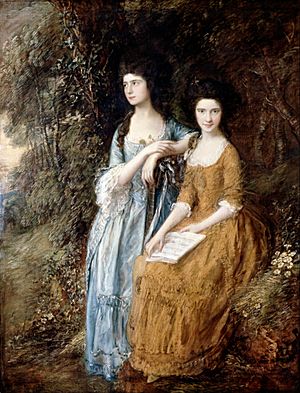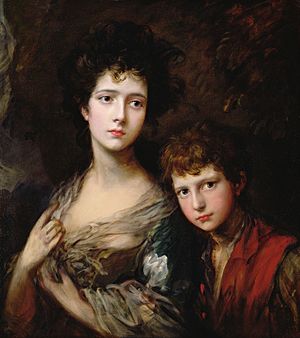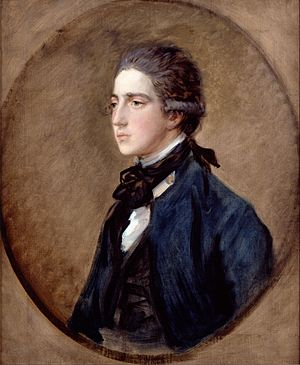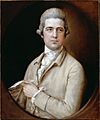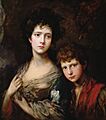Thomas Linley the elder facts for kids
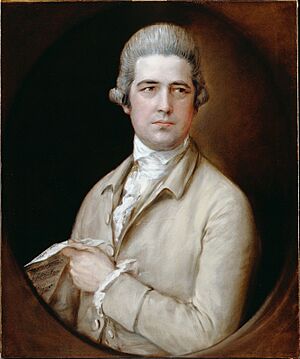
Thomas Linley (born January 17, 1733 – died November 19, 1795) was a famous English musician and bass singer. He was very active in the city of Bath, Somerset. Thomas Linley started his music journey when he moved to Bath at age 11. There, he became an apprentice to Thomas Chilcot, who was an organist.
After marrying Mary Johnson in 1752, Linley first earned money mainly by teaching music. As his children grew up, he helped them develop their amazing musical talents. Their concerts brought in more and more money. Linley also managed the assembly rooms in Bath, which were places for social events and concerts. When the new Bath Assembly Rooms opened in 1771, Linley became the music director. He continued to help his children become famous musicians. Eventually, he moved to London with a lot of money he had earned from their performances.
Linley taught many students, including his eight children: Elizabeth Ann, Thomas, Mary, Samuel, Maria, Ozias, William, and Jane. He also taught other singers like Charles Dignum and Anna Maria Crouch, and even the writer Frances Sheridan. Thomas Linley worked with his son, Thomas, to create the funny opera The Duenna. His son-in-law, Richard Brinsley Sheridan, wrote the words (called the libretto) for the opera.
Early Life and Family
Thomas Linley was the oldest child of William and Maria Linley. He was born on January 17, 1733, in a village called Badminton, Gloucestershire. When he was 11 years old in 1744, his family moved to Bath, Somerset. There, he became an apprentice to Thomas Chilcot, who played the organ at Bath Abbey. An apprentice learns a skill or trade by working for an expert. Before this, Linley helped by pumping the organ. He might have also learned from Pietro Domenico Paradisi and William Boyce, who were famous musicians.
On May 11, 1752, Thomas Linley married Mary Johnson. She was also very musical, almost as talented as her husband. They had 12 children over 18 years, but only eight of them lived past childhood. Seven of their children became musicians or actors:
- Elizabeth Ann Linley (1754–1792): His oldest daughter, who married Richard Brinsley Sheridan.
- Thomas Linley the younger (1756–1778): His oldest son, a composer and a great violinist.
- Mary Linley (1758–87): A singer who stopped performing after marrying Richard Tickell.
- Samuel Linley (1760–1778): His second son, a singer and oboe player.
- Maria Linley (1763–84): A singer.
- Ozias Thurston Linley (1765–1831): An organist.
- William Linley (1771–1835): A composer and writer.
Another daughter, Jane Nash, sang as a hobby. When the children were young, a music historian named Charles Burney visited them. He heard them singing and playing instruments and called the family "a Nest of Nightingales."
The Linley family lived well in Bath, and Thomas worked as a music teacher. They moved to a bigger house to fit all their children. Even though his father helped with money, the family sometimes had financial problems. Linley's wife, Mary, was very careful with money.
Music Career and Success
In the early years of his marriage, Linley was the only one earning money for his family. Some of his older children, like Elizabeth and Mary, even stayed with relatives or at boarding school. Linley was a tenor singer, an organist, and a harpsichord player. But at first, he made most of his money by teaching music. Many people wanted him to teach them. Frances Sheridan, who later became a famous writer, was one of his students. He also taught Anna Maria Crouch and Charles Dignum.
Students often had to give a part of their earnings back to their teachers. Linley trained his own children in music from a very young age. The children started working early, first selling concert tickets, then performing. Elizabeth began singing in concerts when she was just nine years old in 1763. Linley took all the money his talented children earned, and they quickly became a major source of his income.
In 1766, Linley took over managing the music performances at the Assembly rooms in Bath. He had been playing the harpsichord there since 1755. His two oldest children, Elizabeth and Thomas, helped sell tickets for these concerts starting in 1762.
The new Bath Assembly Rooms opened in 1771, and Linley became the Music Director. His regular concerts, featuring his children, were always full, and his family started to become wealthy. They moved to a more fashionable address, Royal Crescent, which raised their social standing. The children also started performing in concerts further away, including oratorios in London. Linley asked for high fees for his children. For example, organizers of a charity concert had to pay £100 for two of his daughters to sing.
When Elizabeth married Richard Brinsley Sheridan on April 13, 1773, newspapers estimated that Linley had earned almost £10,000 from her performances alone.
In 1773, Linley made a deal with John Christopher Smith and John Stanley for his older children to perform at the Theatre Royal, Drury Lane, in London. These performances earned over £500 per night during the Lenten season. The next year, in 1774, Linley joined Stanley in managing the theatre, directing, writing, and organizing music.
Two years later, in June 1776, Linley, his son-in-law Richard Brinsley Sheridan, and Doctor James Ford (a doctor for the king) bought half of the theatre for £35,000. Linley moved to London and used his properties in Bath as collateral to raise his £10,000 share for the purchase. Two years later, they bought the rest of the theatre from David Garrick for a similar amount, owning it completely. In 1780, the Royal Society of Musicians made him a member.
According to music expert Mollie Sands, Linley was one of the "most famous English-born music teachers." As a composer, Linley wrote and arranged songs for The Duenna in 1775. He wrote it with his son, Thomas, at Sheridan's request. The opera was a huge success, performed 75 times at Drury Lane. Lord Byron even called it "the best opera ever written." Linley also worked with John Burgoyne on the successful play Richard Coeur de lion in 1786.
Death
Thomas Linley died suddenly on November 19, 1795, at his home in Westminster. His wife outlived him, but sadly, most of his children had passed away at a young age before him.
Images for kids
See also
 In Spanish: Thomas Linley (padre) para niños
In Spanish: Thomas Linley (padre) para niños
 | Calvin Brent |
 | Walter T. Bailey |
 | Martha Cassell Thompson |
 | Alberta Jeannette Cassell |


